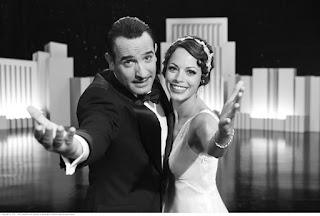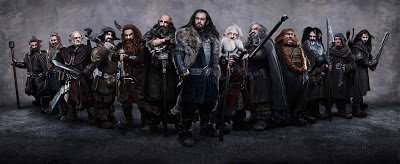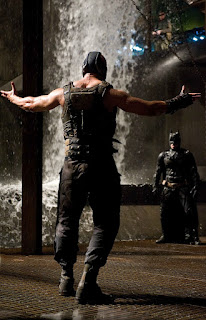10) Argo
Part spy thriller, part Hollywood satire, Argo was the film that proved Ben
Affleck still had so much to offer as a director and also allowed the former
tabloid scapegoat to give all his detractors the birdie. Gigli suddenly feels like a long, long time ago.
9) The Artist
The year’s riskiest proposition, no doubt. But
thanks to Golden Age nostalgia and Jean DuJardin’s irresistible charm, Michael
Hazanavicius’ silent film made a big noise at the 84th Academy
Awards, and even went on to nab the Best Picture statuette in the process.
8) Young Adult
A protagonist doesn’t always have to be a goody
two shoes – sometimes she can be an irredeemable bitch, as long as she’s an
entertaining one to watch. In that retrospect, Mavis Gary may well be Charlize
Theron’s greatest role and screenwriter Diablo Cody’s greatest creation, while
Jason Reitman refuses to conform to standards by denying his heroine a
redemptive arc. There are no lessons learnt here and Young Adult is all the more fascinating because of it.
7) 21 Jump Street
It was a toss-up between this and Ted for the position of funniest film of
the year. But while Seth MacFarlane’s teddy-com is little more than a feature
length Family Guy skit, 21 Jump Street earns extra brownies
points for: a) turning a straight-faced 80s cop show into a riotous laugh-fest;
b) revealing that comedy is a surprisingly good fit for Ken doll lookalike
Channing Tatum; and c) featuring the most hysterical trip out scene ever
committed to film. Throw in one of the best celebrity cameos ever and you’ve
got Christmas.
6) Looper
Joseph Gordon-Levitt has been on a helluva roll
recently and Rian Johnson’s sci-fi thriller is unquestionably among his best
work. Yes, the plot feels like a slightly tweaked version of The Terminator, but it puts a fresh spin
on the time travel genre. No, JGL looks nothing like a young Bruce Willis, but
it’s all in the mannerisms, not in the dodgy make-up. More importantly, Johnson
is not afraid to visit some very dark, nasty places along the way, making Looper not only the most intelligent
sci-fi flick of the year, but also one of the ballsiest.
5) Headhunters
Proof that sometimes the best films are found
outside of Hollywood, Headhunters
hails from Scandinavia but is a very different beast to The Girl with the Dragon Tattoo. Coming off as a Norwegian version
of The Fugitive, it pulls off the
impressive feat of blending pitch black comedy and breathtaking suspense. It
also features an intriguing protagonist in the form of Roger Brown, an
insufferable little man who somehow manages to win us over by enduring all
sorts of extensive torture, as he flees from flawless alpha male Nikolaj
Coster-Waldau. Furthermore, it’s not every day you come across a film that has
you in tears of laughter at the sight of a dog impaled on a moving forklift. Irked
by that last statement? Watch the film and you’ll understand.
4) Skyfall
We knew Sam Mendes had something big planned
for 007’s 50th anniversary, but boy we were never expecting
something this good. Gone was the sappy moping over Vesper Lynd and the
incomprehensible choppy editing from Quantum
of Solace and in were the impressively choreographed set-pieces (the London
Underground chase being the stand-out) and a sharp script that expanded the
Bond mythology, whilst also paying homage to everything that came before
(hello, vintage Aston Martin). But perhaps what was most exciting was to see
Daniel Craig finally owning the role of James Bond, much in the same way Sean
Connery and Pierce Brosnan did in their respective third outings. And as for
that ending… well, let’s just say it’ll be exciting to see where Craig &
co. will take Bond next.
3) Shame
There is an unwritten rule in Hollywood that
states if you want to be taken seriously as an actor, you’re going to have to
get naked. But what Michael Fassbender does in Shame, a Manhattan-set tale about a closet sex addict, goes beyond
conventional mainstream nudity. It’s a raw, exposed performance that
occasionally borders on emotionally bruising, whether it is felt in the vicious
exchanges with on-screen sister Carey Mulligan, or during the brutal sex scenes
with a string of nameless partners. Fassbender had already impressed in
previous roles, but thanks to Steve McQueen’s drama he’s now made an indelible
mark on cinema. It’ll be hard to take our eyes off him (or his crotch) from now
on.
2) The Imposter
There’s no arguing that the main aim of
documentaries is to inform, but what sets The
Imposter apart from its peers is that it also works exceptionally well as a
straightforward mystery thriller. Bart Layton’s film focuses on how charming
French conman Frederic Bourdin managed to convince a Texan family he was their
long lost son Nicholad Barclay, who disappeared under mysterious circumstances
in the mid-nineties. Through the use of re-enacted events, retrieved home
footage and a disarmingly honest first person account by Bourdin himself,
Layton gives us an insider’s view to a story so twisted and chilling, it’s nigh
impossible a screenwriter could ever come up with a mystery thriller that
matches its unpredictability. The fact that it all happened for real makes for
essential viewing.
1) The Avengers
The Dark Knight Rises was a fitting conclusion to
Christopher Nolan’s grounded Batman trilogy and The Amazing Spiderman introduced the world to a superior
Spidey/Peter Parker in the form of Andrew Garfield. But both films lacked the
fun, humour and epic scale of The
Avengers, Marvel’s ambitious pet project that saw comic book heavyweights
Thor, Iron Man, Captain America and The Incredible Hulk team up against an
almighty common foe.
And to think it could’ve gone all so wrong. Bringing
six superheroes and four separate franchises together was a giant gamble and
while there was never any doubt people were going to turn up on curiosity
alone, nobody expected The Avengers would
be such an overwhelming success at the box office AND with critics worldwide.
“The wait was worth it”, USA Today solemnly announced; “The Avengers have been assembled and
they fit together superbly”, gushed Empire
magazine; “smartly thought out and executed with verve and precision” said the Los Angeles Times of Joss Whedon’s
excellent approach to the superhero team dynamic. Even top critic Roger Ebert,
who has a reputation for being particularly heavy-handed with blockbusters,
couldn’t help but tip his hat to the erstwhile Buffy/Serenity creator.
With $1.3 billion in the bank and a worldwide
army of newly-converted fanboys, it truly feels like Marvel has not only
created an unstoppable cash cow, but also given us a Star Wars for a new generation.



































.jpg)



